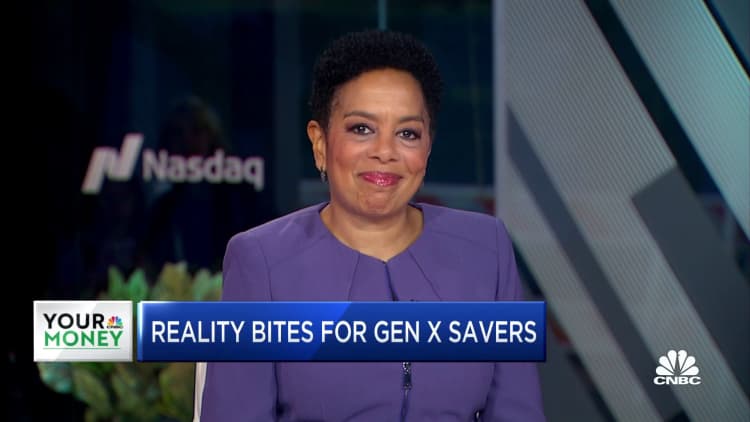In your 40s, you still need a long-term approach for retirement savings, expert says. Here's why
Data shows mixed results for how much those in their 40s have saved toward retirement. Experts say careful planning now can help them reach their goals.

Clemens Porikys | Getty Images Entertainment | Getty Images
If you're in your 40s, you probably have seen articles on how much you should have saved by now to comfortably retire.
One guideline from Fidelity Investments calls for having three times your starting salary saved by 40, with the aim of growing that to six times by age 50.
If you're not confident with the progress you've made to date, the good news is there's still time to get on track.
"If you're in your early 40s, you could have 20, 25, possibly 30 years to save," said Mike Shamrell, vice president of workplace thought leadership at Fidelity.
"It's never too late to start, never too late to start saving," he said.
Savers in their 40s show 'encouraging behavior'
Savers between the ages of 40 and 49 have an average savings rate of 9.1% of their annual salary. With average employer contributions of 4.9% for that cohort, the total savings rate is around 14%.
"We encourage people to aim for a 15% savings rate," Shamrell said. "So that fact that people in their 40s are at 14% is an encouraging behavior."
Today, 401(k)s and other workplace savings plans are typically the main retirement savings vehicle.
However, the 40-something age cohort may have had access to pensions early in their career, Shamrell noted. Moreover, they may have other investment accounts, which means Fidelity's 401(k) data may not fully capture how much workers in their 40s have saved.
Other research has found the retirement outlook for people in their 40s, who mostly belong to Generation X, is not necessarily rosy. The typical Gen X household has just $40,000 saved toward retirement, according to the National Institute on Retirement Security. Having student loan debt was one factor likely to deter their progress, the research found.
Fidelity's savers in their 40s had an average balance of $105,000 at the end of the third quarter.
Why a long-term approach pays off
Notably, those in their 40s who had been in their plan for 10 years straight — in the same plan, with the same employer — had a higher average balance of $286,300 at the end of the third quarter.
Fidelity regularly tracks the share of its 401(k) participants who reach millionaire status with their accounts.
Most of those accounts do not belong to 30- or 40-year-olds, according to Shamrell, a testament to the long-term dedication it takes to reach retirement savings success.
People in their 40s should keep in mind those savings levels don't happen overnight, according to Shamrell.
"If you continue to take a long-term approach and consistently save, the hope is that you will gradually see your savings levels increase," he said.
Money invested can compound, where the earnings generate interest and continue to grow.
When it's time for a wake-up call
"For those who haven't really started saving, this is a real fork in the road," said Winnie Sun, managing director of Irvine, California-based Sun Group Wealth Partners.
Without action now, those investors may have to either make major financial sacrifices or reduce their standard of living when they do retire.
"Most likely, it will be a bit of both," said Sun, who is a member of the CNBC Financial Advisor Council.
Sun recently met with a client in her early 40s with just $50,000 saved for retirement, well short of the goal of having three to four times her $150,000 annual income in a tax-sheltered retirement account.
Sun advised the client and her husband, who had no retirement savings, to pare back their "spend what they earn" mentality.

By taking out extraneous costs, such as a dozen streaming services subscriptions and annual credit card fees, the couple has found $2,000 a month to devote to retirement savings.
Their budget overhaul also includes getting rid of a third car that is unnecessary for their household, finding ways to earn additional income through side gigs or freelance work and possibly even renting out a room in their home.
Coming up with such a plan to get on track with retirement may be difficult without the help of an experienced financial advisor, Sun said.
"When you're in your 40s and your important financial goals like retirement are approaching sooner, you don't have as many years to make mistakes," Sun said.
Factors that can derail retirement savings include credit card debt, oversized mortgages, lack of savings for children's college and not having plans for health or long-term care in place, according to Sun.
Tips to get your retirement savings on track
1. Maximize your 401(k) or other retirement plan contributions.
In 2024, the maximum individuals can put in their 401(k), 403(b), most 457 plans or the federal Thrift Savings plan will be $23,000, up from $22,500 this year.
Those who are 50 and older will be able to put an additional $7,500 in those accounts next year.
IRA savings limits will also go up to $7,000 from a cap of $6,500 this year. People ages 50 and older will be able to put an additional $1,000 in those accounts.
2. Pay down high-interest debts.
Carrying debt balances with high interest rates is one of the biggest mistakes Sun said she often sees from investors in their 40s.
As the Federal Reserve has hiked interest rates this year, those balances have become more expensive.
Experts recommend getting rid of those debts as soon as possible, which can be helped with a 0% balance transfer credit card or by working with a nonprofit credit counselor to come up with a plan.
3. Set up an emergency savings account.
Hardship withdrawals, where a retirement plan participant takes money out of their account, have increased as people continue to face cost-of-living pressures, according to Fidelity.
"People are struggling," Shamrell said.
Unexpected financial emergencies tend to prompt those early withdrawals.
Having emergency savings may serve as a buffer that helps retirement savers keep their money in their 401(k)s or other retirement plans.
Experts typically recommend having at least three months' expenses set aside, if possible.

 JaneWalter
JaneWalter 
































